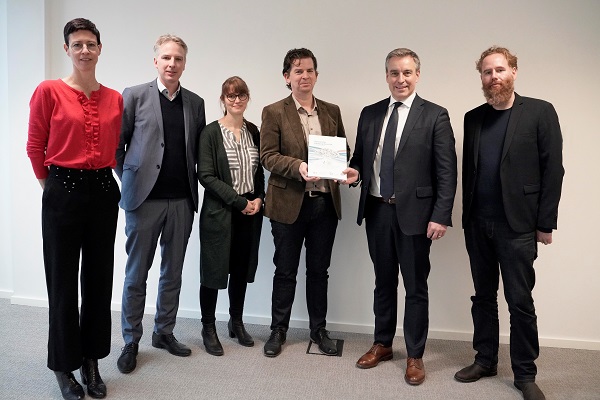 L-R: Prof. Christine Schiltz, University of Luxembourg; Luc Weis, SCRIPT; Dr. Susanne Backes, LUCET; Dr. Thomas Lenz, LUCET; Education Minister Claude Meisch; Prof. Antoine Fischbach, LUCET;
Credit: MENEJ
L-R: Prof. Christine Schiltz, University of Luxembourg; Luc Weis, SCRIPT; Dr. Susanne Backes, LUCET; Dr. Thomas Lenz, LUCET; Education Minister Claude Meisch; Prof. Antoine Fischbach, LUCET;
Credit: MENEJ
On Thursday 9 December 2021, the University of Luxembourg presented the third national report on education, in the presence of Luxembourg's Minister of Education, Children and Youth, Claude Meisch.
This 2021 report examined the question of whether Luxembourg schools are "ready for the future". The analysis focused on digitalisation and education for sustainable development. Other focal points were the COVID-19 pandemic, which has presented the Luxembourg school system with great challenges, and its impact on daily life at school, as well as the issue of existing and new inequalities.
“The pandemic has further sharpened our gaze on the challenges ahead. The national education report confirms our priorities. But at the same time, it makes us aware that major challenges remain to be taken up and that the school system is not yet sufficiently adapted to the social and cultural diversity of the country”, stated Minister Meisch.
Main findings
- Luxembourg is resisting the early stages of the pandemic relatively well: According to the report, Luxembourg schools have been less affected by pandemic-related closures than other countries. They were already well equipped with digital resources before the crisis. As a result, distance education could be implemented quickly by the whole school community. Moreover, measures have been developed to support students and mitigate the effects of the pandemic at the national level;
- The foundations of a digital school culture in Luxembourg have been laid: After the 2018 International Computer and Literacy Study (ICILS) study showed that the digital skills of Luxembourgish students were below the international average, coding, the new Digital Sciences course, the one2one strategy and the reference guide for education in and through the media have laid the foundations for a digital school culture in Luxembourg. The effect of this strategy on student skills will be visible in the years to come, according to the report;
- In the field of non-formal work with young people, the references of the framework plan for education for sustainable development are exemplary: In the field of education for sustainable development, there are a large number of educational projects, tools and approaches. In non-formal education, work with young people is described as exemplary in the report; in formal education, however, there is a lack of a close anchoring of education for sustainable development in study plans;
- A look at old and new injustices: According to the report, the socio-economic and social context still plays a decisive role in the school career of students: the social gap continues to widen in the Luxembourg school system, which does not take into account the social and cultural diversity of the country as a whole.
Returning to the impact of the COVID-19 pandemic, the report noted that even 21 months later, the virus is as unpredictable as ever and still poses great challenges for education.
The Ministry of Education, Children and Youth confirmed that it is making every effort to ensure that schools can function as normally as possible. The ministry also attributed the ability of Luxembourg's schools to resist the pandemic relatively well to the investments made within the framework of the digital education strategy.
Concerning social justice and fair opportunities, the ministry recalled that one of its priorities is to give children and adolescents fair training opportunities. To do this, a series of measures were put in place directly after the first education report in 2015. The effect of these measures, such as the diversification of the school offer, the development and professionalisation of education early childhood education, which have been implemented in recent years, are only partially reflected in this year's report, according to the ministry.
The full national report on education is available, in French and German, at http://www.bildungsbericht.lu/.








